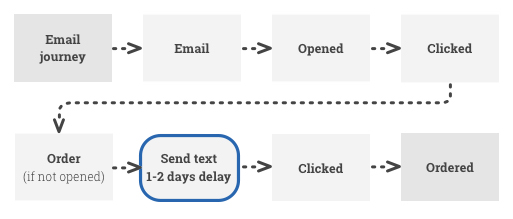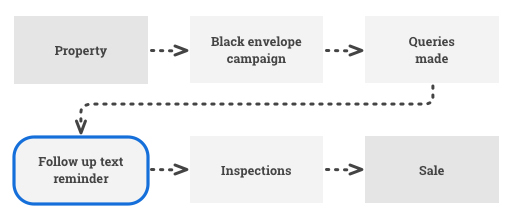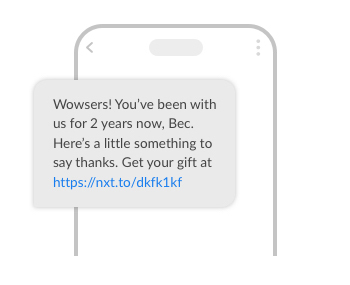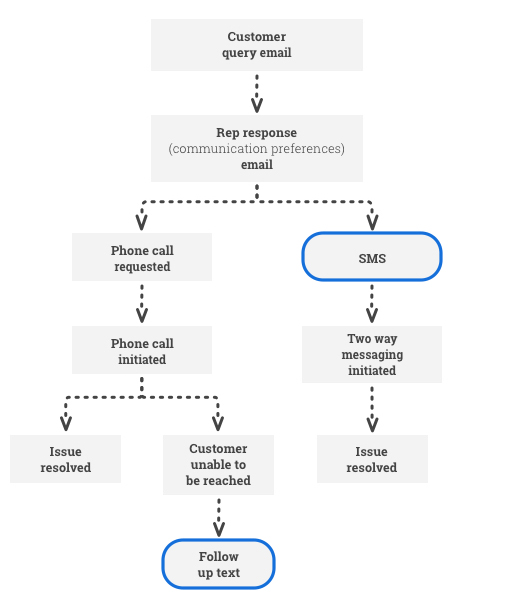Share article:
4 ways to fit SMS into your multichannel mix

Your customers hang out in many places these days. One minute they’re scrolling through their fave social media channel, the next they’re browsing the web and Googling nearby stores. Then they might check their inbox, before sending a quick snap to a friend. All from their phone.
In this multichannel world, marketers have huge opportunities to meet customers in their preferred channel, at their preferred time. And it pays off, with multichannel customers spending three to four times as much as those who you meet in a single channel.
Yet multichannel marketing can take some planning. With people flitting so fast between channels, how do you catch their attention?
Choose your multichannel marketing channels
The key to success with multichannel marketing is knowing which channels to use. First, you need to do some research into your customers. Are they TikTok fans? Or do they prefer Twitter? What about YouTube or Messenger?
To find out, explore social media demographics. Or consider running a competition or poll (hint: SMS is an awesome tool to use for short surveys like this).
Once you’re clear on your customers’ preferences, you can choose the channels to pour your energy into. Map out each channel, including any communication nuances you need to be mindful of. For example, each social platform has different recommended lengths for messages, and specific sizing for images.
And don’t forget about other channels like SMS and email. SMS, in particular, is an invaluable channel to throw into your mix. With an open rate of 98%, text messages get seen more than any other type of marketing message. Adding SMS is guaranteed to help boost the effectiveness of each marketing campaign.
Plot your multichannel marketing journeys
With your channel plan in hand, it’s time to start thinking about when, why, and how you’ll reach customers across different touch points. For example, say you’ve got a big sale event coming up. First, you might want to generate buzz with a tasty teaser campaign on your social channels. On the day the sale starts, a quick SMS with a discount code could help lure in more shoppers.
From sales and promotions, to customer support and win-back campaigns, there are loads of journeys to consider. Here are some tips to get started:
- Map one current customer journey, and look for gaps and opportunities.
- If you’re not already using one, consider a CRM or omnichannel management tool to avoid data silos and reduce administration workloads.
- Pick an SMS service that can be easily integrated into your CRM system.
- Finally, add text messaging to your journey and test, test, test.
4 powerful use cases for SMS in multichannel marketing
SMS is incredibly effective at different stages of the customer journey. Here are four proven use cases that put the power of text messages to work in multichannel marketing.
1. Win back lapsed customers

Add another branch to your sales campaign to capture any customers who don’t open or respond to a key email in the journey.
Sending a quick follow-up SMS to customers who didn’t open their emails increased conversions by 21% for online retailer Vinomofo.
2. Ensure you don’t miss a deal

Real estate agency Bellarine Property was selling an off-market property. It sent out ‘black envelopes’ – as in, exclusive marketing kits – to drum up interest with qualified buyers, which secured some good engagement. But it was the follow-up text message that sealed the deal. The buyer was overseas and didn’t receive the black envelope, but they did see the text and promptly arranged an inspection within days of arriving home
3. Reward your loyal customers

Deals and discounts give loyal customers great reasons to keep coming back. Yet sending these rewards via email alone won’t deliver the best results – response rates for email are lower than for SMS. Send both email and SMS to boost response rates and bolster loyalty.
4. Give seamless support

When it comes to customer support, rethinking the customer experience or journey can really pay off. Not only does it reduce the burden on your call center, but it can help customers get the answers they’re looking for, stat.
For example, when Port Networks started using text messaging as well as phone for customer support, the internet provider experienced a 50% drop in customer wait times.
Want more SMS-style inspiration?
Browse these SMS templates to get a sense of how you could include text messages at different points in the customer journey.
